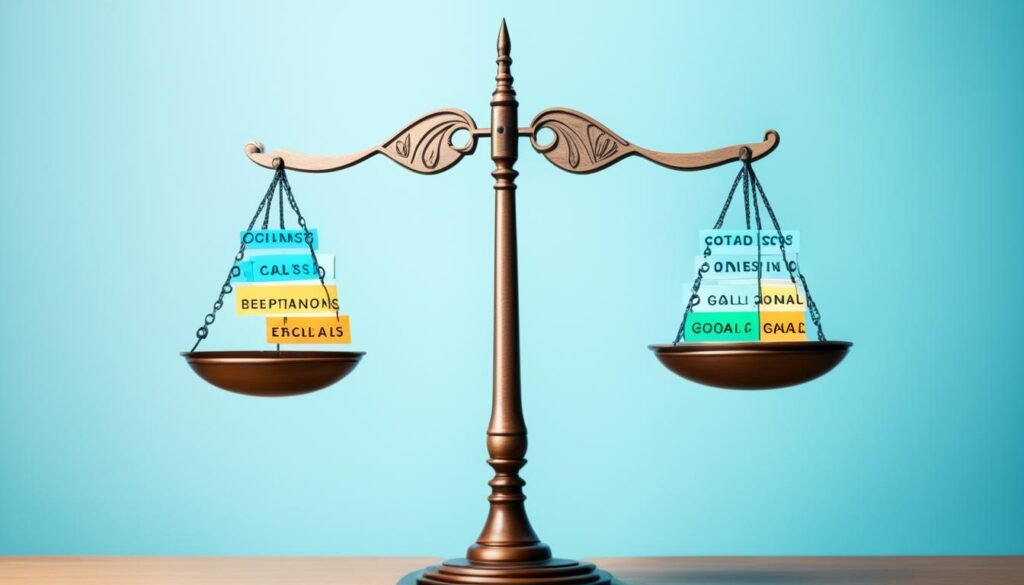In 2020, the Office of the Australian Information Commissioner (OAIC) fined Facebook $1.5 million for mishandling user data. This exposed the personal info of over 300,000 Australians online. This shows how crucial ethical guidelines are for AI development.
AI is now in our homes, workplaces, and healthcare. Experts say we need ethical rules to make sure it’s used right. This article will cover what AI ethics are, why they’re important, and how to make AI development responsible.
AI ethics are about moral rules for making and using AI systems. They focus on fairness, transparency, privacy, and how AI affects people and society. It’s key to add these ethics into AI development to avoid risks and make AI a positive force.
Key Takeaways
- AI is becoming more common in many areas, making ethical guidelines more important.
- Responsible AI means making technology that helps society without causing harm.
- Important AI ethics include fairness, transparency, and privacy.
- Creating responsible AI needs teamwork, teaching, and putting ethics in tech solutions.
- Having good AI ethics policies and following laws like GDPR is vital for companies using AI.
What is Responsible AI?
Responsible AI means making and using artificial intelligence (AI) in a way that’s ethical and legal. It aims to use AI safely and fairly, making sure it helps society without causing harm.
Understanding Responsible AI Principles
Key principles of responsible AI are fairness, transparency, non-maleficence, accountability, privacy, and robustness. These principles are vital for making AI systems that are trustworthy and fair and unbiased.
Importance of Ethical AI Development
As AI grows, it’s key for companies to focus on responsible ai to reduce risks and gain trust. Responsible AI makes sure AI works well, safely, and right, even when things go wrong. This is crucial as AI touches more parts of our lives, like work and making big decisions.
“Only 35% of global consumers trust how AI technology is being implemented by organizations.”
Adding ethical ai rules to the AI process, from start to end, helps tackle bias, privacy, and transparency issues. By focusing on ai ethics principles and ai ethics implementation, companies can make trustworthy ai that helps society.

| Responsible AI Principle | Description |
|---|---|
| Fairness | Ensuring AI systems do not discriminate against or disadvantage specific individuals or groups. |
| Transparency | Making the decision-making process of AI systems transparent and explainable to stakeholders. |
| Non-maleficence | Prioritizing the well-being of humans and preventing unintended harm from AI systems. |
| Accountability | Establishing clear lines of responsibility and liability for the actions of AI systems. |
| Privacy | Protecting the personal data and privacy of individuals used in the development and deployment of AI. |
| Robustness | Ensuring AI systems operate reliably and safely, even in unexpected circumstances. |
Stakeholders in AI Ethics
Creating ethical rules for AI needs teamwork among different ai ethics stakeholders. Academics, government agencies, intergovernmental entities, non-profit organizations, and private companies all have key roles. They work together to tackle social, economic, and political issues with AI. This ensures AI tech is made and used right.
Roles of Different Actors in Promoting AI Ethics
Academics do academic research on ai ethics. They aim to deepen our understanding of ethical issues in AI development and use. They create rules and guidelines for responsible AI practices.
Government agencies and intergovernmental entities are key in setting government regulations on ai ethics. They make policies and laws to keep AI systems ethical. This includes dealing with privacy, bias, and transparency issues.
Non-profit organizations for ai ethics push for ethical use, spread the word, and offer advice. They team up with others to shape the ethical side of AI development.
The private sector also helps with ai ethics through its own AI ethics codes. Companies have their own AI ethics checks. They aim to lessen the risks in their AI products and services.
Together, these ai ethics stakeholders make sure AI tech is made and used for the good of society. It follows ethical rules.
Why AI Ethics Is Important
AI technology is moving fast, bringing both good and bad changes. As AI gets smarter and more common, we see why AI ethics matter a lot. The importance of AI ethics is about tackling the bad sides of AI and making sure it fits with our values.
Addressing Potential Risks and Challenges
AI ethics is key because of the risk of biased and discriminatory AI systems. These systems can learn from biased data, making them unfair to some groups. This can lead to unequal access to things like healthcare and jobs.
There’s also a big worry about privacy and data protection with AI. AI handles a lot of personal info, so we must protect it well. We need to follow strict rules to keep people’s privacy safe.
Also, AI’s lack of transparency and accountability can make people doubt it. We need AI that’s clear, explainable, and takes responsibility. This helps keep trust in AI and avoids bad outcomes.
| Potential Risks of Unethical AI | Challenges in Implementing Ethical AI |
|---|---|
|
|
By tackling these risks and challenges, we see the importance of AI ethics. Adding ethics to AI making can prevent bad effects, help society, and make sure we use AI right.

Ethical Considerations in AI
As AI becomes more common, we must think about its ethical sides. Key concerns include AI bias and AI and data privacy.
AI and Bias
AI can keep or even increase human biases if its training data lacks diversity. This can cause unfair results, like Amazon’s biased tool that preferred men over women. To fix this, we need to take steps like retraining and making companies responsible for bias.
AI and Privacy
AI uses a lot of data, which raises questions about consent and how it’s used. For instance, China’s facial recognition tech has worried people about bias against certain groups. It’s vital to protect user data in AI, and we need global rules to manage AI responsibly.
Dealing with these issues is key to making ethical AI that helps everyone. We must focus on fairness and protecting data to build trust in AI.

“The White House recently invested $140 million in funding for AI ethics and provided additional policy guidance, underscoring the importance of responsible AI development.”
Promoting Ethical AI Practices
As AI use grows, it’s key for companies to focus on ethical AI practices. This means working together, learning, and adding ethical rules at every AI stage.
Best Practices for Responsible AI Implementation
Here are ways to support ethical AI:
- Establish Ethical AI Governance: Use ethics committees to check on rules and help make ethical choices.
- Prioritize Privacy Protection: Keep user data safe with strong privacy and security steps.
- Encourage Transparency: Be open about AI system development and use to build trust.
- Continuously Test for Bias: Check AI for bias often and fix any unfairness to ensure fairness.
- Emphasize Ongoing Education: Keep training staff on how to use AI responsibly.
- Collaborate Across Disciplines: Work with different experts to create ethical AI solutions.
Following these steps shows a company’s commitment to ethical AI. It builds trust with customers and keeps up with AI ethics frameworks and AI ethics governance rules.

“Responsible AI adoption is not just an ethical duty, but a business imperative. Companies that embed ethics into their AI strategies can benefit from building trust, ensuring legal compliance, and preventing harm.”
With implementing ethical AI as a top goal, companies must tackle AI risks and challenges. By following best practices for responsible AI, they lead in ethical AI use. This drives innovation and keeps customer trust.
Examples of Responsible AI
Adding ethical rules to AI development is key for making the tech trustworthy and helpful. Companies like FICO show how to use AI right. They make credit scores with AI but check for bias often to be fair.
In healthcare, PathAI tests its AI tools a lot to make sure they work well. This makes people trust the tech more. IBM’s Watsonx Orchestrate also helps make hiring fair by finding diverse candidates and valuing different views.
These examples prove that AI can be both strong and right. By focusing on fairness, being open, and taking responsibility, companies can use AI’s big benefits. They can also avoid its big problems.
| Company | Responsible AI Practice | Benefits |
|---|---|---|
| FICO | Regularly auditing AI algorithms for bias in credit scoring | Promotes fairness and trust in the lending process |
| PathAI | Rigorous clinical testing of AI-powered diagnostic tools | Ensures accuracy and reliability of healthcare AI systems |
| IBM | Diverse candidate pools and inclusive interviews in hiring | Fosters fairness and diversity in the recruitment process |
These examples show how ethical rules make AI safe and good for many areas and groups.
Challenges in Implementing AI Ethics
AI ethics is crucial, but making it real is tough. We face big challenges in making ethical AI a reality. One major issue is algorithmic bias, where AI can unfairly treat people if the data it learns from is biased. Privacy and data protection are also big problems, as we collect and use personal data ethically.
Addressing Bias and Discrimination
AI can mirror and boost biases in its training data, causing unfair results. This is a big problem that needs fixing to make AI systems fair and equitable. Developers must always check for and fix biases during AI development.
Privacy and Data Protection Concerns
Using personal data in AI raises big privacy and data protection concerns. Companies need to think carefully about how they collect, store, and use data. This is to protect privacy and follow laws like the GDPR.
Transparency and Accountability Issues
Getting transparency and accountability in AI is hard. Many AI systems are like “black boxes,” making it hard to see how they make decisions. This can hurt trust and cause bad outcomes. We need explainable AI and clear rules to make AI more responsible.
“The challenges of implementing ethical AI are complex and multifaceted, requiring a holistic approach that addresses bias, privacy, transparency, and accountability.”
Beating these challenges is key for companies to make AI systems that are truly ethical and good for society. We need ongoing research, policy work, and practical steps to make responsible AI a reality.
Creating More Ethical AI
Building ethical AI needs a mix of policy, education, and tech. Laws can make sure AI helps society. Sharing easy-to-use resources can lower risks from bad or biased AI. AI tools can also spot bad behavior in other AI systems, making them more trustworthy.
Choosing the right ethical framework is a big step in making ethical AI. For over 20 years, researchers have tried to add ethics to AI. They use descriptive ethics to create ethical questions for AI to follow.
The Delphi system uses descriptive ethics and deep learning to guess human ethical choices. But, it warns about AI biases since it learns from the internet. Picking and training AI data without bias is a big challenge.
Still, ethical AI can watch over things faster and on a bigger scale than humans. AI can spot people or activities that seem suspicious, keeping us safe. Kitware is working with others to add ethics to AI for defense, intelligence, and private use.
By thinking about AI ethics at every step, we can make AI systems safe, fair, and in line with human values. We need to work on regulatory frameworks for responsible AI, strategies for ethical AI development, and tools to create more ethical AI. This way, AI can reach its full potential and help society.
“AI can fix or change unfairness among humans, like finding biased hiring or promotion and helping leaders be more inclusive.”
Conclusion
Artificial intelligence (AI) is changing fast, making us focus more on ethics in its making and use. We need to follow key rules like fairness, transparency, and human control. This way, AI can be advanced and match our moral and social values.
It’s important to know who is involved in AI, like policymakers, tech companies, and users. Working together, learning, and making strong rules can help solve AI problems. These include bias, privacy issues, and not being accountable. This ensures AI helps us in a good way.
We must take a big-picture view of AI ethics and how to use AI right. By focusing on ethics, we can use AI to make a better future for everyone. This means a future that is just, fair, and prosperous for all.
FAQ
What is responsible AI?
Responsible AI means making and using artificial intelligence in a way that’s safe and right. It focuses on being fair, clear, and honest. It also means being accountable, private, and strong.
Why is AI ethics important?
AI ethics matter because AI can do things that humans do. But it can also make the same mistakes. If AI uses bad data, it can hurt certain groups of people. Making AI ethical helps avoid these problems and makes things better for everyone.
What are the key stakeholders in AI ethics?
Many groups work together to make AI ethical. This includes schools, governments, groups that help people, and companies. They all make sure AI is used and made in a good way.
What are some ethical considerations in AI?
Important ethical issues in AI are bias and privacy. AI can keep or make biases worse if the data is not diverse. Privacy is also a big worry because AI uses a lot of data, making us think about consent and how it’s used.
How can organizations promote ethical AI practices?
To promote ethical AI, companies need to work together and teach people about AI. They should use ethical rules at every step of AI development. Having ethics teams helps check if things are being done right and guides good choices.
What are some examples of responsible AI in practice?
Some companies are doing AI the right way. FICO’s Fair Isaac Score uses AI to check creditworthiness and checks for bias. PathAI makes sure its AI tools are accurate and reliable by testing them in real situations. IBM’s Watsonx Orchestrate helps make hiring fair by finding diverse candidates and encouraging different views in interviews.
What are some challenges in implementing AI ethics?
Fixing bias in AI is a big challenge because AI can treat unfairly if the data is not diverse. Privacy and protecting data are also big issues because of how AI uses personal information. Making AI decisions clear and making people accountable are hard tasks for companies to overcome to make AI responsible.
How can we create more ethical AI?
To make more ethical AI, we need to work on policy, teaching, and technology. Laws can help make sure AI is good for society. Teaching people about AI risks can help avoid bad AI. AI tools can also spot when other AI systems are not right, making AI more trustworthy.
